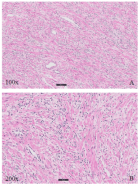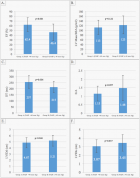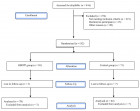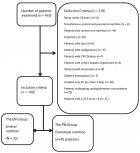Abstract
Review Article
Maximizing the Potential of Ketogenic Dieting as a Potent, Safe, Easy-to-Apply and Cost-Effective Anti-Cancer Therapy
Simeon Ikechukwu Egba* and Daniel Chigbo
Published: 03 March, 2025 | Volume 9 - Issue 1 | Pages: 001-005
The global menace of cancer requires supplementary treatments beyond standard medical approaches for effective medical intervention. The Ketogenic Diet (KD) composed of high fats combined with moderate proteins and low carbohydrates has become popular as a metabolic therapy for cancer. The anti-cancer mechanism of KD works through metabolic stress induction in cancer cells, reduced insulin and IGF-1 signaling pathways, improved mitochondrial function, inflammation, and immune regulation. Standard cancer treatments receive enhanced outcomes through KD synergistic action which simultaneously decreases treatment-related side effects. To achieve optimized treatment outcomes in cancer, ketogenic diet practitioners need to use personalized nutritional planning in combination with metabolic tracking and exogenous ketone supplements. It is essential to find solutions for diet adherence issues and nutrient deficiencies because they determine KD’s effectiveness as a cancer treatment. The fight against cancer needs sustained and multipronged clinical research and validation to establish the proper implementation of this method.
Read Full Article HTML DOI: 10.29328/journal.acst.1001047 Cite this Article Read Full Article PDF
Keywords:
Ketogenic diet; Cancer therapy; Metabolic therapy; Ketosis; Oncology
References
- Debela DT, Muzazu SG, Heraro KD, Ndalama MT, Mesele BW, Haile DC, et al. New approaches and procedures for cancer treatment: Current perspectives. SAGE Open Med. 2021;9:20503121211034366. Available from: https://doi.org/10.1177/20503121211034366
- Liu B, Zhou H, Tan L, Siu KTH, Guan XY. Exploring treatment options in cancer: tumor treatment strategies. Sig Transduct Target Ther. 2024;9:175. Available from: https://doi.org/10.1038/s41392-024-01856-7
- Mathew M, Nguyen NT, Bhutia YD, Sivaprakasam S, Ganapathy V. Metabolic signature of Warburg effect in cancer: An effective and obligatory interplay between nutrient transporters and catabolic/anabolic pathways to promote tumor growth. Cancers. 2024;16(3):504. Available from: https://doi.org/10.3390/cancers16030504
- Zhu H, Bi D, Zhang Y, Kong C, Du J, Wu X, et al. Ketogenic diet for human diseases: the underlying mechanisms and potential for clinical implementations. Sig Transduct Target Ther. 2022;7:11. Available from: https://doi.org/10.1038/s41392-021-00831-w
- Ahmad Y, Seo DS, Jang Y. Metabolic effects of ketogenic diets: Exploring whole-body metabolism in connection with adipose tissue and other metabolic organs. Int J Mol Sci. 2024;25(13):7076. Available from: https://doi.org/10.3390/ijms25137076
- Weber DD, Aminzadeh-Gohari S, Tulipan J, Catalano L, Feichtinger RG, Kofler B. Ketogenic diet in the treatment of cancer – Where do we stand? Mol Metab. 2020;33:102-121. Available from: https://doi.org/10.1016/j.molmet.2019.06.026
- Weber DD, Aminzadeh-Gohari S, Tulipan J, Catalano L, Feichtinger RG, Kofler B. Ketogenic diet in the treatment of cancer - Where do we stand? Mol Metab. 2020;33:102-121. Available from: https://doi.org/10.1016/j.molmet.2019.06.026
- Sun D, Gao W, Hu H, Zhou S. Why 90% of clinical drug development fails and how to improve it? Acta Pharm Sin B. 2022 Jul;12(7):3049-3062. Available from: https://doi.org/10.1016/j.apsb.2022.02.002
- Kong X, Gao P, Wang J, Fang Y, Hwang KC. Advances of medical nanorobots for future cancer treatments. J Hematol Oncol. 2023;16:74. Available from: https://doi.org/10.1186/s13045-023-01463-z
- Bose S, Zhang C, Le A. Glucose metabolism in cancer: The Warburg effect and beyond. In: Le A, editor. The Heterogeneity of Cancer Metabolism. Adv Exp Med Biol. 2021;1311:1-22. Available from: https://doi.org/10.1007/978-3-030-65768-0_1
- Jaworska M, Szczudło J, Pietrzyk A, Shah J, Trojan SE, Ostrowska B, et al. The Warburg effect: a score for many instruments in the concert of cancer and cancer niche cells. Pharmacol Rep. 2023;75:876-890. Available from: https://doi.org/10.1007/s43440-023-00504-1
- Menyhárt O, Győrffy B. Dietary approaches for exploiting metabolic vulnerabilities in cancer. Biochim Biophys Acta Rev Cancer. 2024;1879(2):189062. Available from: https://doi.org/10.1016/j.bbcan.2023.189062
- Xiao YL, Gong Y, Qi YJ, Shao ZM, Jiang YZ. Effects of dietary intervention on human diseases: molecular mechanisms and therapeutic potential. Sig Transduct Target Ther. 2024;9:59. Available from: https://doi.org/10.1038/s41392-024-01771-x
- Gonzalez-Flores D, Gripo A-A, Rodríguez A-B, Franco L. Consequences of glucose enriched diet on oncologic patients. Appl Sci. 2023;13(5):2757. Available from: https://doi.org/10.3390/app13052757
- Kasprzak A. Insulin-like growth factor 1 (IGF-1) signaling in glucose metabolism in colorectal cancer. Int J Mol Sci. 2021;22(12):6434. Available from: https://doi.org/10.3390/ijms22126434
- Khan MZ, Zugaza JL, Torres Aleman I. The signaling landscape of insulin-like growth factor 1. J Biol Chem. 2025;301(1):108047. Available from: https://doi.org/10.1016/j.jbc.2024.108047
- Solarek W, Koper M, Lewicki S, Szczylik C, Czarnecka AM. Insulin and insulin-like growth factors act as renal cell cancer intratumoral regulators. J Cell Commun Signal. 2019;13:381-394. Available from: https://doi.org/10.1007/s12079-019-00512-y
- Kotsifaki A, Maroulaki S, Karalexis E, Stathaki M, Armakolas A. Decoding the role of insulin-like growth factor 1 and its isoforms in breast cancer. Int J Mol Sci. 2024;25(17):9302. Available from: https://doi.org/10.3390/ijms25179302
- Läsché M, Emons G, Gründker C. Shedding new light on cancer metabolism: A metabolic tightrope between life and death. Front Oncol. 2020;10:409. Available from: https://doi.org/10.3389/fonc.2020.00409
- Wang SF, Tseng LM, Lee HC. Role of mitochondrial alterations in human cancer progression and cancer immunity. J Biomed Sci. 2023;30:61. Available from: https://doi.org/10.1186/s12929-023-00956-w
- Zhao H, Wu L, Yan G, Chen Y, Zhou M, Wu Y, et al. Inflammation and tumor progression: signaling pathways and targeted intervention. Signal Transduct Target Ther. 2021;6(1):263. Available from: https://doi.org/10.1038/s41392-021-00658-5
- Cicchese JM, Evans S, Hult C, Joslyn LR, Wessler T, Millar JA, et al. Dynamic balance of pro- and anti-inflammatory signals controls disease and limits pathology. Immunol Rev. 2018;285(1):147-167. Available from: https://doi.org/10.1111/imr.12671
- Moya-Garzon MD, Wang M, Li VL, Lyu X, Wei W, Tung AS, et al. A β-hydroxybutyrate shunt pathway generates anti-obesity ketone metabolites. Cell. 2025;188(1):175-186.e20. Available from: http://dx.doi.org/10.1016/j.cell.2024.10.032
- Chu J, Gao F, Yan M, Zhao S, Yan Z, Shi B, et al. Natural killer cells: a promising immunotherapy for cancer. J Transl Med. 2022;20:240. Available from: https://doi.org/10.1186/s12967-022-03437-0
- Wang MM, Coupland SE, Aittokallio T, Figueiredo CR. Resistance to immune checkpoint therapies by tumour-induced T-cell desertification and exclusion: key mechanisms, prognostication and new therapeutic opportunities. Br J Cancer. 2023;129:1212-1224. Available from: https://doi.org/10.1038/s41416-023-02361-4
- Duraj T, Kalamian M, Zuccoli G, Maroon JC, D’Agostino DP, Scheck AC, et al. Clinical research framework proposal for ketogenic metabolic therapy in glioblastoma. BMC Med. 2024;22:578. Available from: https://doi.org/10.1186/s12916-024-03775-4
- Alpuim Costa D, Gonçalves-Nobre JG, Sampaio-Alves M, Guerra N, Arana Ribeiro J, et al. Hyperbaric oxygen therapy as a complementary treatment in neuroblastoma - a narrative review. Front Oncol. 2023;13:1254322. Available from: https://doi.org/10.3389/fonc.2023.1254322
- Picó C, Serra F, Rodríguez AM, Keijer J, Palou A. Biomarkers of nutrition and health: new tools for new approaches. Nutrients. 2019;11(5):1092. Available from: https://doi.org/10.3390/nu11051092
- Marino P, Mininni M, Deiana G, Marino G, Divella R, Bochicchio I, et al. Healthy lifestyle and cancer risk: Modifiable risk factors to prevent cancer. Nutrients. 2024;16(6):800. Available from: https://doi.org/10.3390/nu16060800
- Ghazizadeh E, Naseri Z, Deigner HP, Rahimi H, Altintas Z. Approaches of wearable and implantable biosensors towards developing in precision medicine. Front Med (Lausanne). 2024;11:1390634. Available from: https://doi.org/10.3389/fmed.2024.1390634
- Vo D-K, Trinh KTL. Advances in wearable biosensors for healthcare: Current trends, applications, and future perspectives. Biosensors. 2024;14(11):560. Available from: https://doi.org/10.3390/bios14110560
- Malinowska D, Żendzian-Piotrowska M. Ketogenic diet: A review of composition diversity, mechanism of action and clinical application. J Nutr Metab. 2024;2024:6666171. Available from: https://doi.org/10.1155/2024/6666171
- Kalam F, James DL, Li YR, Coleman MF, Kiesel VA, Cespedes Feliciano EM, et al. Intermittent fasting interventions to leverage metabolic and circadian mechanisms for cancer treatment and supportive care outcomes. J Natl Cancer Inst Monogr. 2023;2023(61):84-103. Available from: https://doi.org/10.1093/jncimonographs/lgad008
- Tiwari S, Sapkota N, Han Z. Effect of fasting on cancer: A narrative review of scientific evidence. Cancer Sci. 2022;113(10):3291-3302. Available from: https://doi.org/10.1111/cas.15492
- Fukazawa A, Koike A, Karasawa T, Tsutsui M, Kondo S, Terada S. Effects of a ketogenic diet containing medium-chain triglycerides and endurance training on metabolic enzyme adaptations in rat skeletal muscle. Nutrients. 2020;12(5):1269. Available from: https://doi.org/10.3390/nu12051269
- Fernández-Verdejo R, Mey JT, Ravussin E. Effects of ketone bodies on energy expenditure, substrate utilization, and energy intake in humans. J Lipid Res. 2023;64(10):100442. Available from: https://doi.org/10.1016/j.jlr.2023.100442
- Talib WH, Mahmod AI, Kamal A, Rashid HM, Alashqar AMD, Khater S, et al. Ketogenic diet in cancer prevention and therapy: Molecular targets and therapeutic opportunities. Curr Issues Mol Biol. 2021;43(2):558-589. Available from: https://doi.org/10.3390/cimb43020042
- Prudencio MB, de Lima PA, Murakami DK, Sampaio LPB, Damasceno NRT. Micronutrient supplementation needs more attention in patients with refractory epilepsy under ketogenic diet treatment. Nutrition. 2021;86:111158. Available from: https://doi.org/10.1016/j.nut.2021.111158
- Rollet M, Bohn T, Vahid F, On Behalf of The Oriscav Working Group. Association between dietary factors and constipation in adults living in Luxembourg and taking part in the ORISCAV-LUX 2 survey. Nutrients. 2021;14(1):122. Available from: https://doi.org/10.3390/nu14010122
- Crosby L, Davis B, Joshi S, Jardine M, Paul J, Neola M, et al. Ketogenic diets and chronic disease: Weighing the benefits against the risks. Front Nutr. 2021;8:702802. Available from: https://doi.org/10.3389/fnut.2021.702802
- Lane J, Brown NI, Williams S, Plaisance EP, Fontaine KR. Ketogenic diet for cancer: Critical assessment and research recommendations. Nutrients. 2021;13(10):3562. Available from: https://doi.org/10.3390/nu13103562
- Martínez-Garay C, Djouder N. Dietary interventions and precision nutrition in cancer therapy. Trends Mol Med. 2023;29(7):489-511. Available from: https://doi.org/10.1016/j.molmed.2023.04.004
Figures:
Similar Articles
-
Chlorhexidine and oral cancer: A short reviewShrivardhan R Kalghatgi*,Mahesh R Khairnar,Tanushri Dalvi. Chlorhexidine and oral cancer: A short review. . 2020 doi: 10.29328/journal.acst.1001012; 4: 001-002
-
Palliative care approach to oncological patient – Main pointsOnur Öztürk*,Muhammed Emin Göktepe,Mustafa Ünal. Palliative care approach to oncological patient – Main points. . 2020 doi: 10.29328/journal.acst.1001015; 4: 015-016
-
Magnetic Properties of Reactive Oxygen Species and their Possible Role in Cancer TherapyBoris Minaev*. Magnetic Properties of Reactive Oxygen Species and their Possible Role in Cancer Therapy. . 2024 doi: 10.29328/journal.acst.1001044; 8: 048-053
-
Maximizing the Potential of Ketogenic Dieting as a Potent, Safe, Easy-to-Apply and Cost-Effective Anti-Cancer TherapySimeon Ikechukwu Egba*,Daniel Chigbo. Maximizing the Potential of Ketogenic Dieting as a Potent, Safe, Easy-to-Apply and Cost-Effective Anti-Cancer Therapy. . 2025 doi: 10.29328/journal.acst.1001047; 9: 001-005
Recently Viewed
-
Clinical and Histopathological Mismatch: A Case Report of Acral FibromyxomaMonica Mishra*,Kailas Mulsange,Gunvanti Rathod,Deepthi Konda. Clinical and Histopathological Mismatch: A Case Report of Acral Fibromyxoma. Arch Pathol Clin Res. 2025: doi: 10.29328/journal.apcr.1001045; 9: 005-007
-
Unconventional powder method is a useful technique to determine the latent fingerprint impressionsHarshita Niranjan,Shweta Rai,Kapil Raikwar,Chanchal Kamle,Rakesh Mia*. Unconventional powder method is a useful technique to determine the latent fingerprint impressions. J Forensic Sci Res. 2022: doi: 10.29328/journal.jfsr.1001035; 6: 045-048
-
Doppler Evaluation of Renal Vessels in Pediatric Patients with Relapse and Remission in Different Categories of Nephrotic SyndromeAmit Nandan Dhar Dwivedi*, Srishti Sharma, OP Mishra, Girish Singh. Doppler Evaluation of Renal Vessels in Pediatric Patients with Relapse and Remission in Different Categories of Nephrotic Syndrome. J Clini Nephrol. 2023: doi: 10.29328/journal.jcn.1001112; 7: 067-072
-
Atlantoaxial subluxation in the pediatric patient: Case series and literature reviewCatherine A Mazzola*,Catherine Christie,Isabel A Snee,Hamail Iqbal. Atlantoaxial subluxation in the pediatric patient: Case series and literature review. J Neurosci Neurol Disord. 2020: doi: 10.29328/journal.jnnd.1001037; 4: 069-074
-
Intelligent Design of Ecological Furniture in Risk Areas based on Artificial SimulationTorres del Salto Rommy Adelfa*, Bryan Alfonso Colorado Pástor*. Intelligent Design of Ecological Furniture in Risk Areas based on Artificial Simulation. Arch Surg Clin Res. 2024: doi: 10.29328/journal.ascr.1001083; 8: 062-068
Most Viewed
-
Evaluation of Biostimulants Based on Recovered Protein Hydrolysates from Animal By-products as Plant Growth EnhancersH Pérez-Aguilar*, M Lacruz-Asaro, F Arán-Ais. Evaluation of Biostimulants Based on Recovered Protein Hydrolysates from Animal By-products as Plant Growth Enhancers. J Plant Sci Phytopathol. 2023 doi: 10.29328/journal.jpsp.1001104; 7: 042-047
-
Sinonasal Myxoma Extending into the Orbit in a 4-Year Old: A Case PresentationJulian A Purrinos*, Ramzi Younis. Sinonasal Myxoma Extending into the Orbit in a 4-Year Old: A Case Presentation. Arch Case Rep. 2024 doi: 10.29328/journal.acr.1001099; 8: 075-077
-
Feasibility study of magnetic sensing for detecting single-neuron action potentialsDenis Tonini,Kai Wu,Renata Saha,Jian-Ping Wang*. Feasibility study of magnetic sensing for detecting single-neuron action potentials. Ann Biomed Sci Eng. 2022 doi: 10.29328/journal.abse.1001018; 6: 019-029
-
Pediatric Dysgerminoma: Unveiling a Rare Ovarian TumorFaten Limaiem*, Khalil Saffar, Ahmed Halouani. Pediatric Dysgerminoma: Unveiling a Rare Ovarian Tumor. Arch Case Rep. 2024 doi: 10.29328/journal.acr.1001087; 8: 010-013
-
Physical activity can change the physiological and psychological circumstances during COVID-19 pandemic: A narrative reviewKhashayar Maroufi*. Physical activity can change the physiological and psychological circumstances during COVID-19 pandemic: A narrative review. J Sports Med Ther. 2021 doi: 10.29328/journal.jsmt.1001051; 6: 001-007

HSPI: We're glad you're here. Please click "create a new Query" if you are a new visitor to our website and need further information from us.
If you are already a member of our network and need to keep track of any developments regarding a question you have already submitted, click "take me to my Query."
















































































































































